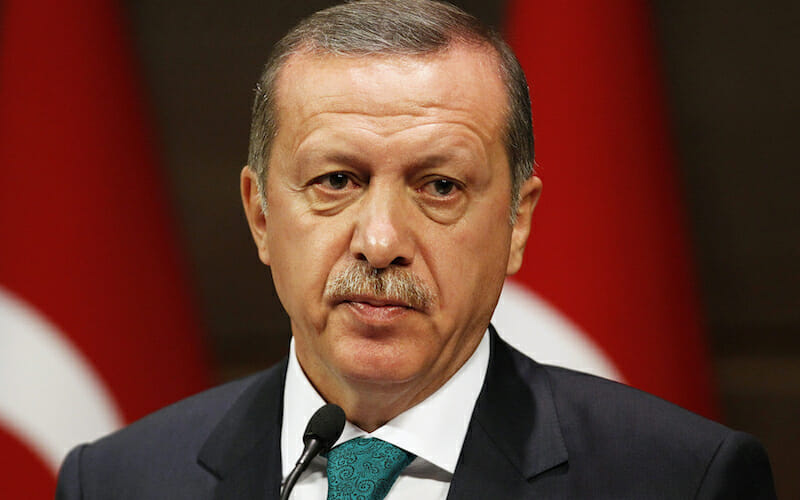
Showdown in Syria
With the Turkish attack on the Kurdish enclave of Afrin in northwestern Syria, it has now come to a showdown between the U.S. and its supposed NATO ally, Turkey. The question is, who will back down first.
In a distortion of historical fact, President Erdogan stated at an AKP (Justice and Development Party) rally in Bursa that the aim of “Operation Olive Branch” was to restore Afrin to its “rightful owners,” the Arabs. Although Afrin is predominantly Kurdish, he claimed that Afrin was 55 percent Arab and only 35 percent Kurdish and that the Kurds were resettled there. In fact, it was the policy of Syria’s Baathist government in the 1960s to expropriate the Kurds from their lands along the border with Turkey and Iraq and create an Arab belt.
When Erdogan speaks of “helping our brothers to own their own land,” he means the motley band of jihadis that make up the so-called Free Syrian Army (FSA), which is supporting the Turkish advance. He has also spoken of resettling the 3.5 million Syrian refugees who have fled to Turkey. However, Turkish bombing and artillery fire have also hit Syrian refugees who have taken refuge in Afrin to escape the fighting further south.
Initially, Erdogan promised that the operation would be completed “in a very short period of time,” but now he talks of launching an attack on Manbij, a town 60 miles east of Afrin, which has been held by the Kurdish PYG (People’s Defense Units) militia with U.S. support since 2016. Furthermore, “our battles will continue until no terrorist is left right up to our border with Iraq.”
Turkey’s broad definition of ‘terrorism’ is well known and now includes criticism of the Afrin operation. Turkey’s foreign minister Mevlut Cavusoglu has stated: “Anyone who opposes Turkey’s operation in northern Syria’s Afrin region is siding with terrorists and will be treated accordingly,” and Erdogan has made it clear, “whoever opposes us will be crushed.” Over 300 have been detained for “spreading terrorist propaganda” and Erdogan has branded the Turkish Medical Association as “terrorist lovers” after it called for peace.
The original U.S. strategy in Syria, which aimed at unseating Bashar al-Assad, changed direction when it became apparent that the creation of an Islamic state (ISIL) was a greater threat. Ironically, according to a Defense Intelligence Agency (DIA) memo from August 2012, the possibility of establishing a Salafist principality in eastern Syria was “exactly what the supporting powers to the opposition want in order to isolate the Syrian regime.”
The plan backfired, especially as Turkey had its own agenda for regime change. Consequently, the only reliable allies the U.S. could find to combat ISIL were the Kurds, who were intent on establishing their own autonomous region in northern Syria. However, in August 2016, Turkish forces occupied the area between the Euphrates and Afrin, but the Kurdish YPG held on to Manbij west of the Euphrates, effectively blocking a Turkish advance further east.
Matters came to a head a fortnight ago, when to Turkey’s fury the US-led Combined Joint Task Force (CJTF) announced the formation of a 30,000-strong “Border Security Force,” primarily consisting of YPG fighters, which would be deployed along the border with Turkey, the Iraqi border and along the Euphrates River Valley. The Pentagon backtracked and called it a “kind of security and stabilization force,” and according to Secretary of State Rex Tillerson, “Some people misspoke. We are not creating a border security force at all.” But the damage had been done.
When Turkey announced its intention of attacking Afrin, the Pentagon immediately distanced itself from the YPG in Afrin and stated: “We don’t consider them as part of our Defeat ISIS operations and we do not support them.” Despite mounting civilian casualties, the Pentagon dismisses Afrin as “a distraction” and insists, “Turkey is an ally and we’re going to work with them.”
This appeasement policy has not only failed but has encouraged Turkey to threaten U.S. forces in Syria. Ilnur Cevik, President Erdogan’s senior diplomatic advisor, has even called on American troops to pack up and go home. Nevertheless, General Joseph Votel, head of U.S. Central Command, has told CNN that withdrawing U.S. forces from Manbij is “not something we are looking into.”
The obvious beneficiary to the standoff is Russia, which at a meeting with the Turkish Chief of General Staff and the head of Turkish intelligence allowed the operation on the understanding that Afrin was “the final and unchanging target” and that the operation would not expand further into Syria. Now that matters are getting out of hand, it must be time for Russia to call President Erdogan to heel and work towards a common understanding with the U.S.
